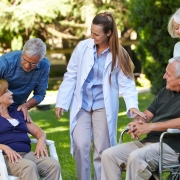Fun in the Sun for Residents in Independent Living for Seniors
When the sun shines bright, it’s the perfect time for residents in independent senior living for seniors to get outside and embrace the joy of summer. Soaking up sunlight isn’t just enjoyable—it’s a natural mood booster, providing essential vitamin D while helping to ease stress, anxiety, and feelings of isolation.
Outdoor activities also foster social connections and mental well-being, whether it’s a lively group picnic, a peaceful stroll through the gardens, or an adventurous sightseeing trip. Summer’s warmth invites seniors to stay active, engaged, and connected with their community—all while promoting a healthier, happier lifestyle.
After all, what better way to celebrate the season than by making memories under the sun?
Outdoor Games and Social Events
Spending time outdoors offers seniors significant mental, social, and physical benefits. The combination of fresh air and gentle movement enhances circulation and improves mobility while naturally elevating mood. Outdoor activities serve as powerful stress relievers, helping to reduce symptoms of depression while simultaneously boosting cognitive function.
Seniors can enjoy a variety of accessible activities that promote both activity and relaxation. Options range from picnics and gardening to birdwatching, fruit picking, attending craft shows, or visiting local markets. For creatively inclined seniors, these outdoor experiences present perfect opportunities for landscape painting or nature photography.
Even seniors with memory challenges or limited mobility can benefit from spending time outdoors. The sensory stimulation of sights, sounds, and smells can evoke positive emotions and memories. Navigating familiar outdoor environments also helps maintain orientation and spatial awareness.
Safety remains paramount for senior outings. Proper preparation includes wearing comfortable clothing and supportive footwear, applying sunscreen, and staying hydrated to prevent heat exhaustion. Choosing senior-friendly locations with accessible pathways ensures everyone can enjoy outdoor time safely and comfortably.
Whether it’s a brief daily walk or a memorable excursion, regular outdoor activity promotes independence, wellness, and an enhanced quality of life. By connecting with nature, residents in independent senior living communities maintain their physical health, mental acuity, and valuable social connections, which contribute to their overall well-being.
Safety Tips for Summer Fun in Independent Living for Seniors
As the summer heat arrives, staying safe is paramount for everyone, especially for seniors. Follow these vital steps to make the most of the sunshine season while protecting your health and skin:
- Hydrate Constantly: Drink plenty of water throughout the day. Avoid sugary or colored beverages, as they can sometimes lead to dehydration.
- Dress Smart for the Heat: Opt for lightweight, loose-fitting, and breathable clothing for maximum comfort. A wide-brimmed hat and sunglasses are essential, particularly during peak sun hours.
- Prioritize Sun Protection: Liberally apply sunscreen with a high SPF to exposed skin and remember to reapply it every two hours, or more often if sweating or swimming.
- Time Your Outdoor Activities: Schedule outdoor excursions for earlier mornings or later afternoons, avoiding the intense heat between 10 AM and 4 PM.
- Recognize and Respond to Heat Signs: If you notice signs of heat exhaustion, such as excessive sweating, dizziness, or nausea, immediately take a break. Find shade and cool down.
- Choose Senior-Friendly Spots: When planning outings, select locations that are easily accessible and have even surfaces to prevent falls and injuries.
- Stay Connected and Prepared: Always carry a fully charged phone and a small emergency kit, and consider investing in an emergency alert device for added peace of mind.
By diligently following these precautions, seniors can safely enjoy summer’s warmth, remain active, and stay healthy, all while enjoying the season’s offerings.
Are you looking for an excellent senior community in Nebraska? Click here to learn about Richmont Senior Living!
Richmont Senior Living is proud to serve Ashland, NE and the surrounding cities: Memphis, Springfield, South Bend, Greenwood, Murdock, Waverly, Murdock, Ithaca, and Chalco











